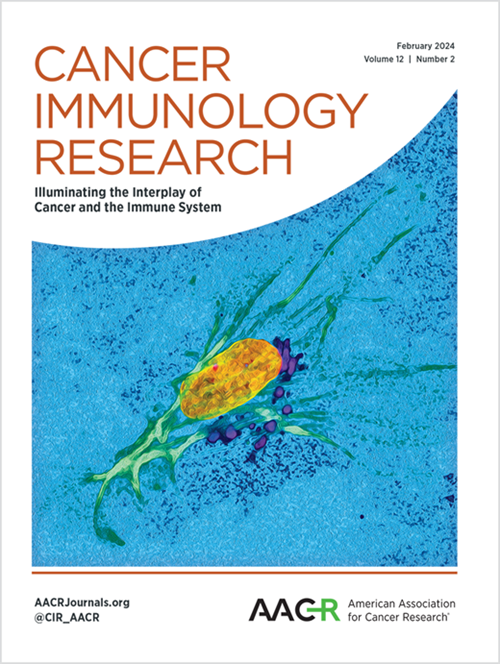化暗为明:Siglec-9 开关。
IF 8.1
1区 医学
Q1 IMMUNOLOGY
引用次数: 0
摘要
肿瘤相关的免疫抑制通过包括异常糖基化在内的多种抑制机制抑制了T细胞疗法治疗癌症的成功。在本期杂志中,艾森伯格及其同事发现,IFNγ会诱导癌细胞的过度糖基化,并通过与免疫细胞上的抑制分子Siglec-9结合,起到 "检查点 "的作用。一种嵌合的 Siglec-9 "开关 "受体能将抑制信号转换为刺激信号,从而恢复肿瘤组织中的 T 细胞反应,这对癌症的采用性细胞疗法具有多方面的意义。见 Eisenberg 等人的相关文章,第 XX (3) 页。本文章由计算机程序翻译,如有差异,请以英文原文为准。
Transforming the Dark into Light: A Siglec-9 Switch.
Tumor-associated immune repression dampens the success of T-cell therapy for cancer by a plethora of inhibitory mechanisms including aberrant glycosylation. In this issue, Eisenberg and colleagues show that IFNγ induces hyper-sialylation of cancer cells and that this acts as the "checkpoint" through binding to the inhibitory molecule Siglec-9 on immune cells. A chimeric Siglec-9 "switch" receptor converts the suppressive signal into a stimulatory signal, thereby restoring T-cell responses in the tumor tissue, which has multiple implications for the use of adoptive cell therapy in cancer. See related article by Eisenberg et al., p. 1380 (3).
求助全文
通过发布文献求助,成功后即可免费获取论文全文。
去求助
来源期刊

Cancer immunology research
ONCOLOGY-IMMUNOLOGY
CiteScore
15.60
自引率
1.00%
发文量
260
期刊介绍:
Cancer Immunology Research publishes exceptional original articles showcasing significant breakthroughs across the spectrum of cancer immunology. From fundamental inquiries into host-tumor interactions to developmental therapeutics, early translational studies, and comprehensive analyses of late-stage clinical trials, the journal provides a comprehensive view of the discipline. In addition to original research, the journal features reviews and opinion pieces of broad significance, fostering cross-disciplinary collaboration within the cancer research community. Serving as a premier resource for immunology knowledge in cancer research, the journal drives deeper insights into the host-tumor relationship, potent cancer treatments, and enhanced clinical outcomes.
Key areas of interest include endogenous antitumor immunity, tumor-promoting inflammation, cancer antigens, vaccines, antibodies, cellular therapy, cytokines, immune regulation, immune suppression, immunomodulatory effects of cancer treatment, emerging technologies, and insightful clinical investigations with immunological implications.
 求助内容:
求助内容: 应助结果提醒方式:
应助结果提醒方式:


